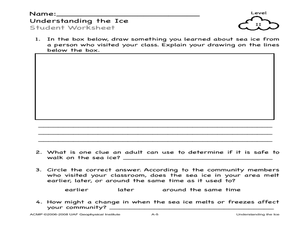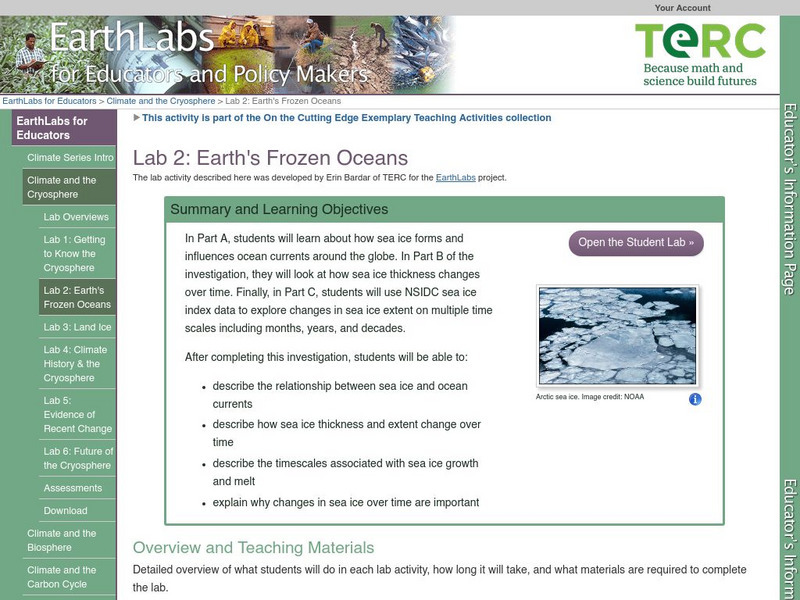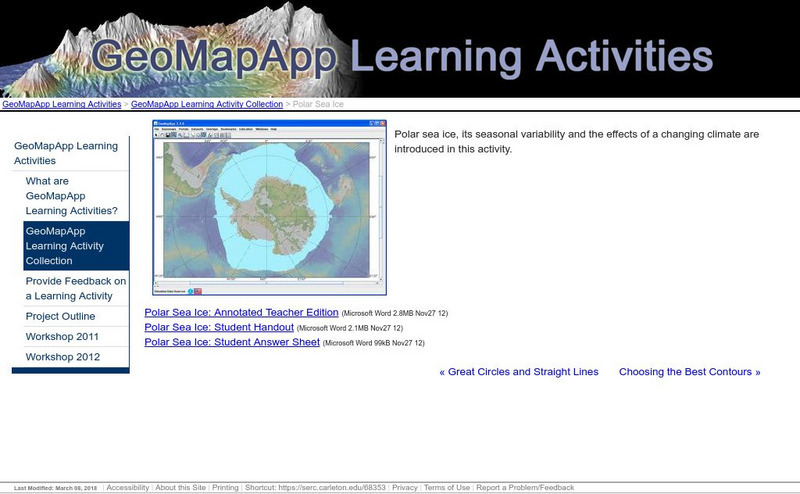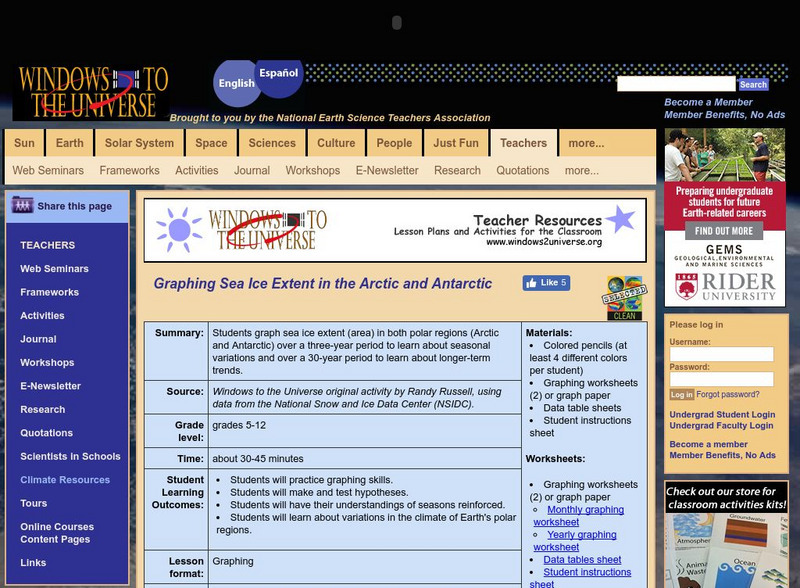Curated OER
Understanding the Ice
Learners explore the concept of sea ice. In this sea ice lesson, students interview arctic hunters to regarding the sea ice safety and attributes.
PBS
Pbs Learning Media: Albedo Decrease Linked to Vanishing Arctic Sea Ice
Examine this visualization by NASA to understand how the warming of the Arctic region has caused the sea ice extent to decline by 40%, thereby throwing our earth's energy budget off balance. Extensive resources included are teaching...
PBS
Pbs Learning Media: Link Between Arctic Sea Ice and Solar Radiation Absorbed
The Arctic plays an important role in regulating Earth's climate. The region reflects much of the Sun's energy and helps keep the planet cool. Data collected by NASA have revealed that sea ice in the Arctic has steadily declined over the...
PBS
Pbs Learning Media: Melting Ice
A mulit-media lesson where students explore the role that ice plays on Earth, the factors causing it to melt, and the local and global consequences of melting ice.
Science Education Resource Center at Carleton College
Serc: Lab 2: Earth's Frozen Oceans
A lab experiment in a series of experiments that investigates climate and the cryosphere. In this particular lab, students explore how sea ice forms, how sea ice thickness changes over time, and how sea ice can affect ocean currents...
Science Education Resource Center at Carleton College
Serc: Sea Ice Extension for the Earth as a System Learning Activity
The purpose of this instructional activity is for students to learn how the Earth's systems interact on a global level. They will examine global environmental data and compare this to data on the polar regions. In the process, they will...
National Snow and Ice Data Center
National Snow and Ice Data Center: All About Sea Ice
An intensive look at sea ice, its characteristics, how it is formed, where it occurs, why it is so important, scientific research, its impact on early explorers' voyages, and so on. Antarctic and Arctic sea ice are compared for...
Scholastic
Scholastic News: Re Creating the Arctic
Studying sea ice in the Arctic region is very difficult. Read how scientists are using an innovative technique of freezing seawater in a pool to study sea ice.
Woods Hole Oceanographic Institution
Polar Discovery: Compare the Poles: Ice
A comparison of the features of ice in the Arctic and the Antarctic. Looks at glaciers, icebergs, pack ice, and multi-year ice.
Science Education Resource Center at Carleton College
Serc: Polar Sea Ice
Polar sea ice, its seasonal variability, and the impact of a changing climate are investigated in this activity. Students will also explore the differences between polar regions that result from Antarctica being a continent and the north...
PBS
Pbs Learning Media: Arctic Ice Extent, 1999 2016
Scientists study sea ice extent closely because it influences global climate. Follow the decline in Arctic sea ice in this animation adapted from NASA showing the yearly maximum and minimum sea ice extents from 1999 to 2016. Resources...
PBS
Pbs Learning Media: Arctic Ice Reaches 2015 Minimum Extent
NASA's Scientific Visualization Studio uses data from several sources to track seasonal changes in Arctic sea ice and land cover over time. Scientists study sea ice because it influences global climate. Watch the following visualization...
Climate Literacy
Clean: Impacts of Topography on Sea Level Change
Young scholars use web-based animations to explore the impacts of ice melt, specifically changes to sea level. They also use topographic maps to examine the relationship between topography and sea level change by mapping changing...
Climate Literacy
Clean: Sea Level Rise
Students will learn the difference between sea ice and glaciers in relation to sea level rise using topographic maps.
Climate Literacy
Clean: March of the Polar Bears: Global Change, Sea Ice, and Wildlife Migration
Students use NASA satellite data to study temperature and snow-ice coverage in the South Beaufort Sea, Alaska. With the data, they investigate global change, sea ice changes, and polar bear migration.
National Earth Science Teachers Association
Windows to the Universe: Graphing the Extent of Sea Ice in Arctic and Antarctic
Students graph sea ice extent in both polar regions over a three-year period to learn about seasonal variations, and over a 30-year period to learn about longer-term trends.













